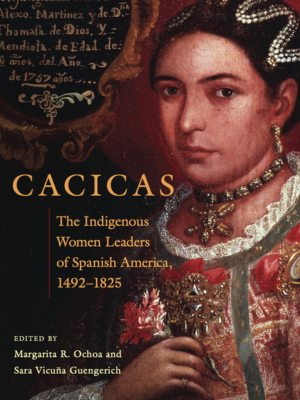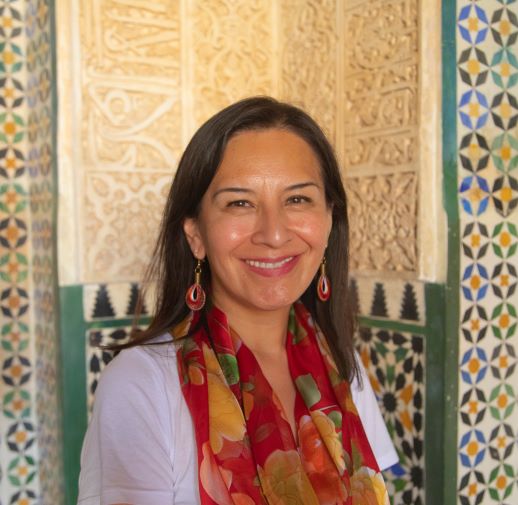Spanish Faculty
Dr. Sara Guengerich
Associate Professor and Director of the Spanish Program
Affiliated Faculty at the Women’s Studies Program & the Medieval and Renaissance Studies
Center
sara.guengerich@ttu.edu
CV
Sara Vicuña Guengerich received her doctorate from the University of New Mexico. Her research on colonial Spanish America examines how marginalized individuals and organized sectors counteracted the systemic disenfranchisement of colonialism. As a literary historian, she aims to reconstruct the everyday experiences of a variety of historical subjects, particularly indigenous people, some who were born into noble lines and thus retained both prestige and a variety of concrete legal claims, and many who were born without the privileges of power. She includes their stories in the larger historical narrative of the global early modernities. These stories, written from below and from within their sectors, chart how indigenous people conceptualized and interpreted their status in colonial society to improve, resist, and claim privileges through their involvement as litigators in court, petitioners in royal audiences, and memberships of local and global networks. She has worked extensively in Bolivian, Peruvian, and Spanish archives, as well as in U.S. research libraries tracing the lives of native individuals and groups in their efforts to carve out spaces for themselves in a world that had been turned upside down.
She is Past President of the Grupo de Estudios sobre la Mujer en España y las Américas, pre-1800 (GEMELA).
For updates about her research beyond this page visit:
ORCID
academia.edu
ResearchGate
#WomenAlsoKnowHistory.com
Areas of Research
- Colonial Latin America History
- Indigenous Peoples of the Andes (16th through 18th centuries)
- Cultural and Gender studies
- Afro-Hispanic Colonial Narratives
- Ecocriticism in the Colonial Spanish Northern Frontier
- Material Culture in the Early Modern Hispanic World
Selected Publications
Edited Books
Co-edited with Margarita R. Ochoa, The Cacicas of Spanish America, 1492-1825 (University of Oklahoma Press, 2021). — Best Collaborative Project Award by the Grupo de Estudios sobre la Mujer en España y las Américas, pre-1800.

Selected Refereed Articles
“Las mujeres de Vilcabamba” Histórica. Pontificia Universidad Católica del Perú 47.1 (2023): 173-198. https://revistas.pucp.edu.pe/index.php/historica/article/ /view/27815
“No todos se honraban con el término ‘mestizo’: Cusqueños en Sevilla y la racionalización de la diferencia racial en los siglos XVI y XVII.” Historia y Cultura. Revista del Museo Nacional de Arqueología, Antropología e Historia del Perú 33 (2022): 13-41. https://revistas.cultura.gob.pe/index.php/historiaycultura/article/view/56
“On the Inclusion of ‘Other’ Women: Gender and Race in the Early Modernities.” Early Modern Women: An Interdisciplinary Journal 17.1 (2022): 2-5. https://www.journals.uchicago.edu/doi/abs/10.1086/720938?journalCode=emw
“Mining the Archive: The Global Microhistory of a Peruvian Coya” Modern Philology 119.1 (2021): 61-76. https://doi.org/10.1086/714891
“[Por] haberme cabido en suerte ser de la familia y sangre de los Incas”: Linaje, lengua y limpieza de la sangre materna en la obra del Inca Garcilaso de la Vega. Philologia Hispalensis 32.2 (2018): 117-130. http://dx.doi.org/10.12795/PH.2018.v32.i02.08
“Capac Women and the Politics of Marriage in Early Colonial Peru.” Colonial Latin American Review 24.2 (2014): 147-167. https://doi.org/10.1080/10609164.2015.1040275
Selected Refereed Chapters
“Indigenous Peoples of the Andes During the Colonial Period.” In Oxford Bibliographies. New York: Oxford University Press. Forthcoming 2024.
“Indigenous Andean Women and the Written Word in the Early Modern World.” In The Palgrave Encyclopedia of Early Modern Women’s Writing. Forthcoming 2024.
“The Inca Garcilaso de la Vega on Women.” In Approaches to Teaching the Writings of Inca Garcilaso de la Vega. eds. Christian Fernández and José Antonio Mazzotti. New York: The Modern Language Association of America, 2022. https://www.mla.org/Publications/Bookstore/Approaches-to-Teaching-World-Literature/Approaches-to-Teaching-the-Works-of-Inca-Garcilaso-de-la-Vega
“A Royalist Cacica: Doña Teresa Choquehuanca and the Postrebellion Natives of the Peruvian Highlands.” In Cacicas: The Indigenous Women Leaders of Spanish America, 1492-1825, eds. Margarita Ochoa and Sara Guengerich. Norman: University of Oklahoma Press, 2021. https://books.google.com/books/about/Cacicas.html?id=izYGEAAAQBAJ&printsec=frontcover&source=kp_read_button&hl=en&newbks=1&newbks_redir=0#v=onepage&q&f=false
“Inca Women Under Spanish Rule.” Women’s Negotiations and Textual Agency in Latin America, 1500–1799. Mónica Díaz and Rocio Quispe-Agnoli, eds. New York: Routledge, 106-29, 2016. https://www.routledge.com/Womens-Negotiations-and-Textual-Agency-in-Latin-America-1500-1799/Diaz-Quispe-Agnoli/p/book/9780367885342
Public Scholarship/ Media Appearances
- Las cosas tienen vida (podcast): “Tupus: Cultura material de las mujeres indígenas de los Andes”
- The New Book Networks (podcast): Interview about the book, The Cacicas of Spanish America, 1492-1825 (University of Oklahoma Press, 2021)
- Sucedió en el Perú (TV Show): Interview about Indigenous Women in Colonial Peru.
Teaching
Dr. Guengerich enjoys introducing undergraduate students to Latin America's dynamic past and complicated present in culture and language courses, as well as offering specialized upper-level courses on themes such as race, gender, and visual studies in colonial and contemporary Latin American societies. At the graduate level, she shares with students her fascination with the Spanish American colonial world, along with broader interests in women’s history, indigeneity, and the global early modernities.
Courses Commonly Taught
- Fashion and Identity in Latin America (SPAN 3000: Cultural Topics)
- Introduction to Hispanic Literatures (SPAN 3000)
- Visual Encounters: Texts and Films of the Spanish American Colonial Period (SPAN 4000)
- Study Abroad Special Topics in Spanish Language and Cultures (SPAN 3000/4000)—Seville, Spain
- Indigenous Intellectuals in the Colonial 'Lettered City (SPAN 5370)
- Introduction to Colonial Spanish American Literatures and Cultures (SPAN 5370)
- The Women of Colonial Latin America (SPAN 5370)
- Colonial Blackness: Race and Identity in the Spanish American Colonial World (SPAN/HIST 5355)

CMLL Spanish Program
-
Address
CMLL Building, 2906 18th St, Lubbock, TX 79409 -
Phone
806.742.3145
